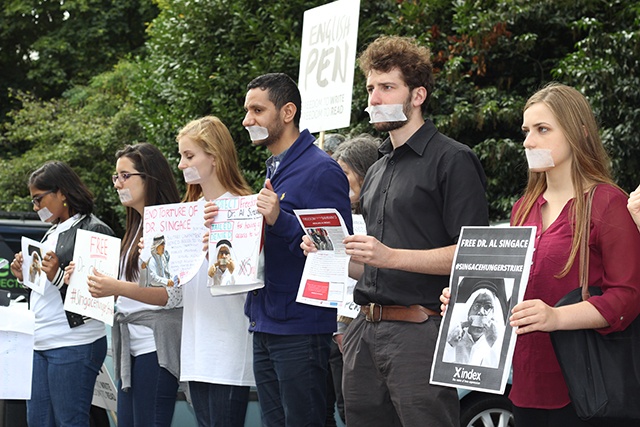Index relies entirely on the support of donors and readers to do its work.
Help us keep amplifying censored voices today.
Human rights activist, Nabeel Rajab, was summoned to a military court just hours before Bahrain was due to lift its emergency law. He is now missing. Rajab is president of the Bahrain Center for Human Rights (BCHR). Bahrain’s state of emergency was lifted today, introduced almost three months ago, the emergency law coincided with the arrival of over 1, 000 Saudi troops who were called to crush largely peaceful Shiite protests.
Members of CNN’s news team were arrested by the government’s security forces as they were visiting the house of Nabeel Rajab, head of the Bahrain Center for Human Rights.
Twenty men in black ski masks are reported to have surrounded the news team and confiscated their recording equipment. Government officials have alleged that the team was detained at a checkpoint for not having the proper identification paers. CNN denies the claim and insists its reporters were subject to intimidation and censorship.
[vc_row][vc_column][vc_column_text]The call by four Arab states — UAE, Bahrain, Saudi Arabia and Egypt — for Qatar to close news network Al Jazeera is clearly motivated by a desire to control the media in the region and silence reporting of stories that these governments would rather not see exposed.
Al Jazeera has brought the world news from the Arab Spring and many of the recent important moments from the region. Including the closure of Al Jazeera in a list of demands that Qatar “should” comply with to end a diplomatic crisis is about reducing media freedom in a region where it is already threatened.
“From its treatment of blogger Raif Badawi to its tightly controlled media environment, the Saudi authorities must not be able to dictate access to information for the public in other countries. Al Jazeera and press freedom must not be used as a bargaining chip,” Rachael Jolley, editor of Index on Censorship said.
None of the nations involved have a free independent media. Bahrain regularly targets critics, journalists and the one remaining opposition newspaper in the country, Al Wasat. Saudi Arabia sentenced blogger Raif Badawi to 10 years in jail and 1,000 lashes for his “criminal” writings. Egypt has regularly tried journalists on accusations of terrorism. The UAE, too, curtails discussion of its domestic policies. UAE Federal Law No. 15 of 1980 for Printed Matter and Publications regulates all aspects of the media and is considered one of the most restrictive press laws in the Arab world, according to Freedom House. Reporters Without Borders ranks them all below 118, with Saudi Arabia, Egypt and Bahrain all below 160 out of the 180 nations it covers.[/vc_column_text][/vc_column][/vc_row][vc_row][vc_column][vc_basic_grid post_type=”post” max_items=”12″ style=”load-more” items_per_page=”4″ element_width=”6″ grid_id=”vc_gid:1498231474147-ef0d779a-68d3-0″ taxonomies=”9044″][/vc_column][/vc_row]
The Bahrain Institute for Rights and Democracy (BIRD), English PEN and Index on Censorship gathered outside the Bahrain Embassy in London on Wednesday 29 July 2015 to protest the ongoing detention of Dr Abduljalil Al-Singace.
Al-Singace is a prominent academic and blogger who promoted human rights in Bahrain since 2000. Police arrested Al-Singace for his participation in peaceful protests in 2011. During his initial detention, security officials subjected Al-Singace to torture and ill-treatment, including forced standing, verbal and sexual assault, beatings, and prolonged solitary confinement. He was tried by a military court in June 2011 and sentenced to life in prison for allegedly plotting to overthrow the government.
Al-Singace’s health has rapidly deteriorated since he was imprisoned, and he is kept from receiving desperately needed medical supplies. On 21 March 2015 Al-Singace began a hunger strike in protest of the ill-treatment of inmates and the poor, unsanitary conditions at Jau Prison. He has now completed 132 days of hunger strike.

(Photo: Moosa Mohammed)
Rights groups gathered at the solidarity protest unanimously called for the release of Al-Singace and denounced restrictions on freedom of expression in Bahrain. The organisations also called on Bahrain to investigate allegations of torture in Bahrain’s prisons and called for urgent medical attention for Al-Singace.
Freedom of expression in Bahrain has continued to be restricted since 2011, when Saudi Arabian troops helped crush pro-democracy protests during the Arab Spring. The government regularly censors its citizens’ opinions, especially criticisms of the government, and imprisonment is a common punishment for simply expressing one’s opinion. Al-Singace is only one of many who have been jailed for expressing their beliefs. His continued strength and activism remains an inspiration to those still fighting within Bahrain and around the world for the fundamental right to freedom of expression.
Take action
Al-Singace suffers from post-polio syndrome, heart, eye, and sinus problems, and requires urgent nasal and ear surgery. Prison authorities have denied Al-Singace the specialist medical treatment that he urgently needs. He is currently being detained at the Al-Qalaa Hospital and is not permitted to go outdoors. He is also being denied access to novels, religious texts, television, radio, and pen and paper for writing.
Join our social media campaign #SingaceHungerStrike in solidarity with Dr. Al-Singace.
Send writing materials and messages of support to Dr. Al- Singace.
Find out more about freedom of expression in Bahrain.
This article was posted on 30 July 2015 at indexoncensorship.org